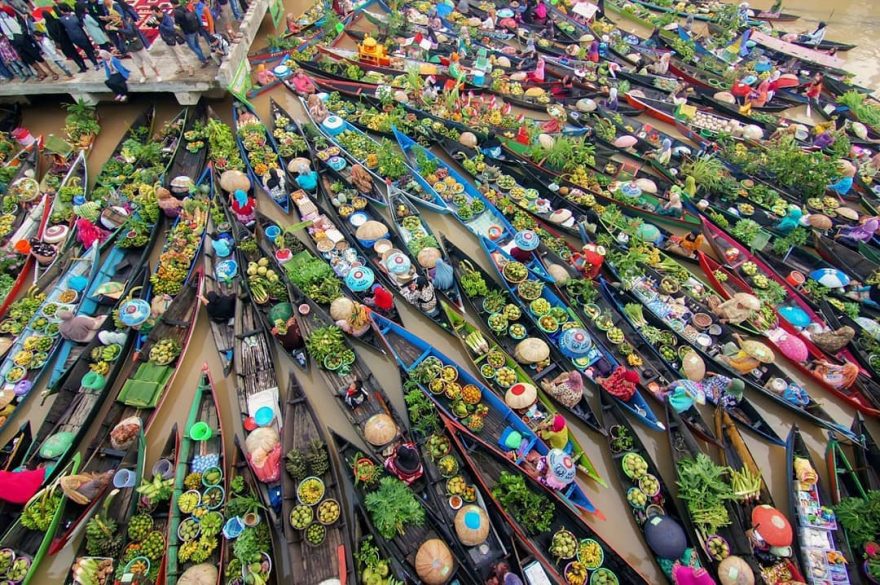This week’s stock market rout has investors looking for assets that don’t move in tune with the FAANG stocks (Facebook, Amazon, Apple, Netflix and Google). For your consideration: Early- and growth-stage companies that provide food, healthcare, energy, and housing and other essentials in emerging markets like Mexico, Indonesia and Egypt.
“Growing consumer populations continue to consume essentials,” write Will Poole and Dimitrios Lagias of Capria, which invests in emerging market private-equity funds, in a market brief that charts the resilience of such consumption in previous market downturns.
What does emerging market volatility mean for impact investors?
To be clear, countries reliant on exports, or that service U.S. domestic consumption, are likely to be caught in the downdraft. “You want to be in the domestic-consumption part of emerging markets,” Poole told ImpactAlpha.
The availability of assets that are “uncorrelated” with mainstream market movements has long been one of the attractions of impact investing. More than half (56%) of the $226 billion in impact investing assets under management identified in this year’s investor survey from Global Impact Investing Network are in emerging markets.
Uncorrelated assets
As global banks suffered major losses in the 2008 financial crisis, investor Ron Cordes said in a 2014 interview, “Unsecured loans to small borrowers in countries I can’t name or find on the map paid off just fine…That was the wake-up call for me to say, ‘Here’s a totally uncorrelated asset class that in the worst financial crisis in my lifetime was the only thing I had invested in that was immune to the crisis.’”
Poole and Lagias argue that not only microfinance institutions, but growing companies driven by private (e.g. non-governmental) local consumption, should show similar resilience. Capria has invested in 16 local impact funds that make sub-$1 million investments in Asia, Africa and Latin America. “In the face of an impending downturn in the US economy, it is our view that consumption-driven companies in well-selected emerging market economies will demonstrate substantial financial resilience, even after allowing for currency depreciation,” they write.
Local consumption in countries in Africa and Asia where Capria has investments was up to 80% more resilient to the 2000 dot-com downturn than U.S. consumption, according to Capria’s market brief. Similarly, consumption in those same countries in Africa, Asia and Latin America grew faster than U.S. consumption after the 2008 sub-prime crisis.
Local resilience
Capria recently announced an investment in Adobe Capital, the venture fund of New Ventures, a social-venture accelerator in Mexico (see, “Capria Fund raises $33 million to invest in early-stage emerging-market funds”). “Most impact industries are focusing in areas like affordable housing, health, education, access to energy and financial inclusion,” New Ventures’ Rodrigo Villar told ImpactAlpha in an earlier interview. “All these industries are tackling local issues where international volatility is not as direct or related as other industries could be.
For Adobe Capital, competitive returns in Mexico run through social ventures
Public equities in emerging markets already have taken a hit, as currency fluctuations, political considerations and recessions have weighed on investor sentiments. In a recent report, Goldman Sachs said emerging-market equities look set to post double-digit returns in 2019 after the volatile bear market of 2018.
“Emerging market volatility means all investment – including impact investment – is likely going to suffer,” Randall Kempner of the Aspen Network of Development Entrepreneurs said earlier this year. He said ‘impact-first’ may be more patient than other impact investors, “and more likely to have invested in businesses that are less exposed to foreign-exchange fluctuations.”
Capria is putting its money where its mouth is. The fund has raised $33 million of a planned $100 million to invest in its network of emerging-market fund managers. The fund has attracted $20 million from Vulcan Capital, the family office of Microsoft co-founder Paul Allen, who died last month. Microsoft’s other co-founder, Bill Gates, is also an investor, as is the International Finance Corp. Other investors include Omidyar Network, Ford Foundation and Resonance Impact Fund.
Investment gurus like Ray Dalio and Mark Mobius have been warning of impending financial crisis and recession for awhile. It’s not yet clear whether this week’s downturn represents the end of the long bull market. But as Capria’s Poole says, “There’s a new interest in, “If that’s going to happen. Where do I go?”
He’s got his pitch ready. “Here’s a place you as a U.S. investor can find long-term growth prospects that are not correlated to the U.S. market.”
For Adobe Capital, competitive returns in Mexico run through social ventures












